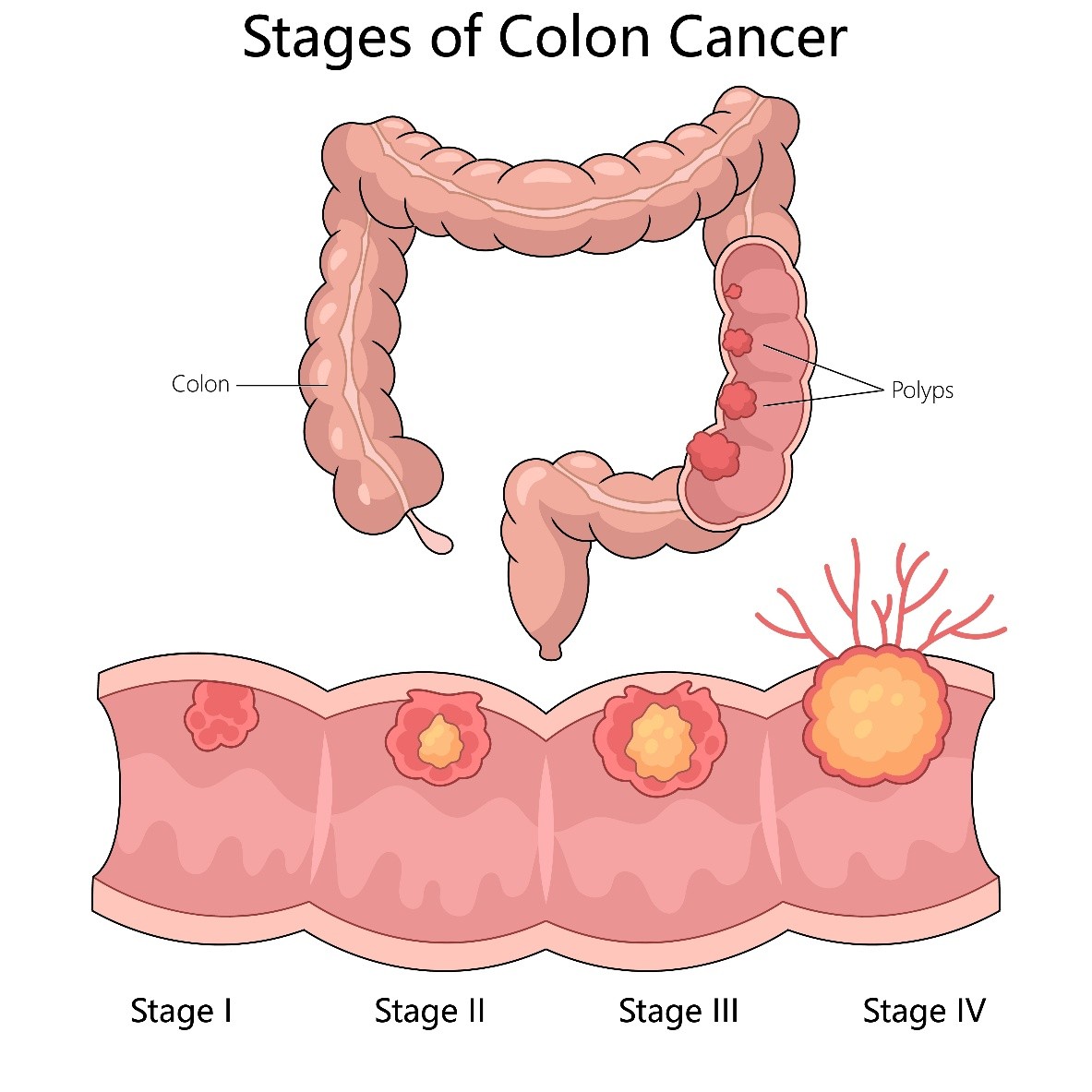Colon Cancer


What is Colon Cancer?
Colorectal cancer is a type of cancer that develops in the colon or rectum. Colorectal cancer often begins as benign polyps on the inner lining of the colon or rectum and slowly develops into cancerous tumours. Therefore, early detection and removal of these benign polyps are crucial in preventing the development of colorectal cancer.
What Are the Stages of Colon Cancer?
Colorectal cancer is categorised into stages (0–IV) to indicate its extent and severity:
Stage 0 (Carcinoma in situ)
– Precancerous cells are confined to the inner lining of the colon or rectum.Stage I
– Cancer has grown into the intestinal wall but has not spread to nearby lymph nodes or beyond the muscular layer.-
Stage II
– Cancer has penetrated deeper into the intestinal wall:- Stage IIA – Confined to the inner layers of the intestinal wall.
- Stage IIB – Spread through the wall but not to adjacent organs or tissues.
- Stage IIC – Spread through the wall or to nearby tissues/organs.
-
Stage III
– Cancer has spread to nearby lymph nodes:- Stage IIIA – Spread to 1–3 lymph nodes or to adjacent tissues.
- Stage IIIB – Spread to 1–3 lymph nodes or to 4 or more lymph nodes with less deep invasion.
- Stage IIIC – Spread to 4–6 lymph nodes or to the lining of the abdomen.
-
Stage IV (Metastatic)
– Cancer has spread to distant organs (e.g., liver, lungs):- Stage IVA – Spread to one distant organ or distant lymph nodes.
- Stage IVB – Spread to multiple distant organs or lymph nodes.
- Stage IVC – Spread to distant organs, lymph nodes, and abdominal tissues.
Colorectal cancer staging can be complex, but it is a crucial step in developing a personalised treatment plan to achieve the best possible outcomes. For a clearer understanding on cancer staging, please consult with your doctor.

What Are the Symptoms of Colon Cancer?
Most colorectal cancers, unfortunately, do most display obvious symptoms. By the time colorectal cancer is detected, 60% of patients would be in the more advanced stages of cancer (stages 3 or 4). Some of the more common symptoms include:
- Change in bowel patterns
- Blood or mucus in stools
- Unexplained and persistent abdominal pain or distension/bloating
- Unexplained loss of weight and appetite
What Are The Risk Factors For Colon Cancer?
Common risk factors for colorectal cancer include:
Age
– The risk significantly increases with age, particularly after 50. Thus, it is recommended that average-risk individuals begin regular colorectal cancer screening at the age of 50.Personal and Family History
– Individuals with a personal history of colorectal cancer or other types of polyps, as well as those with a family history of colorectal cancer (parents, siblings, children), are at an increased risk of developing the disease.Inflammatory Conditions
– Individuals with inflammatory bowel diseases (IBD), like Crohn's disease and ulcerative colitis, have an increased colorectal cancer risk. Chronic inflammation damages the colon lining, increasing the risk of abnormal cell growth.Diet and Lifestyle
– A diet low in fibre and high in processed meat, a sedentary lifestyle, smoking, and heavy alcohol consumption increases the risk of developing colorectal cancer.
How is Colon Cancer Diagnosed?
Diagnosing colorectal cancer involves a combination of medical history, physical examination, and specialised tests.
Physical Exam
– A general physical examination helps assess overall health and may reveal any unusual signs or symptoms.Barium Enema
– This imaging test involves administering a liquid containing barium through the rectum. Barium coats the inside of the colon, allowing for better visualisation of X-ray images.Flexible Sigmoidoscopy
– This procedure uses a flexible, lighted tube (sigmoidoscope) to examine the lower portion of the colon (sigmoid colon) for any abnormalities, such as polyps or tumours.Colonoscopy
– This procedure utilises a colonoscope, (a flexible tube with a camera and light) to examine the entire length of the colon and rectum. It enables the detection and removal of polyps or the collection of tissue samples (biopsies) for further examination.
How are colon and rectal cancers treated?
Surgery is the only curative option for colorectal cancers. Depending on the size, location and stage of the cancer, radiotherapy and/or chemotherapy are sometimes needed to increase the chance of long-term survival. An MRI (Magnetic Resonance Imaging) or CT scan is sometimes done before surgery to better demonstrate the anatomy of the tumour and its surrounding structure.
Colorectal surgery can be performed via traditional open approach (with a long cut/incision down the abdomen), laparoscopically (keyhole) or robotically. Most tumours, unless they are very big, can be resected using the keyhole approach, although the da Vinci robotic systems offer superb dexterity and superior visualisation for rectal cancers within the narrow confines of the pelvis.
How can colon cancer be prevented?
Screening for colorectal cancer has been proven to save lives. In the United States and northern European countries, colorectal cancer mortality has been falling and this can be attributed to screening, early detection, and prevention by polyp removal before they turn cancerous.
In Singapore, regular colonoscopy screening is recommended for both average- and high-risk individuals. General screening guidelines are as follows:
Average-risk Individuals
– This group includes asymptomatic individuals with no first-degree relatives with a history of colorectal cancer. For this group, colorectal cancer screening with colonoscopy is generally recommended to begin at age 50 and be performed every 5–10 years.High-risk Individuals
– Those who have multiple first-degree relatives with colorectal cancer or polyps should schedule regular colonoscopy starting at 40 years old or 10 years younger than the age of the youngest diagnosed individual in the family, whichever is earlier. The recommended frequency of screenings varies from annually to every five years, depending on individual risk factors.
In addition to regular screening, maintaining a healthy lifestyle can also significantly reduce the risk of developing colorectal cancer. This includes regular physical activity, maintaining a healthy weight, and consuming a balanced diet rich in fruits, vegetables, and whole grains while limiting red and processed meats.
Colon Cancer FAQs
Can I get colon cancer before I turn 50?
90% of colorectal cancer cases are diagnosed at age 50 or older; this also means that up to 10% of colorectal cancer occurs in those who are fairly young - below the age of 50.
In those who develop colorectal cancer before 50 years old, genetic factors rather than environmental factors are likely to play a bigger role. It is likely that a young person developing colorectal cancer has a genetic mutation that is inherited from birth, conferring a ‘head start’ in cancer development.
An individual who has at least one of the following traits should consider genetic screening for colorectal cancer:
- Strong family history of 3 of more colorectal cancers affecting 2 or more generations
- Strong family history of multiple relatives with cancers in other organs such as the uterus, ovary, small intestine, bladder and kidneys
- Personal or family history of colorectal cancer or polyps diagnosed before 50 years
- Family history with known hereditary conditions:
- Familial Adenomatous Polyposis (FAP)
- Lynch Syndrome
- Peutz-Jeghers Syndrome (PJS)
- Cowden’s Syndrome
- Multiple polyps in the colon, rectum or the rest of the gastrointestinal tract
- Your managing physician believes there is a possible hereditary component to your colorectal cancer.
Genetic screening is an examination of a person’s genes to look out for patterns of mutations that may indicate a genetic condition or to predict the chance that a person will develop a specific disease or condition in the future.
Having the knowledge can empower a person and his family members to make significant life planning decisions including treatment options that may affect the overall disease outcome, prognosis and the future health status of himself and his family.
Can colon cancer recur after treatment?
In some cases, rectal and colon cancer can recur despite successful treatment. Recurrence can happen locally in the original site or distantly in other organs like the liver or lungs.
What other important information should individuals under 50 be aware of regarding colon cancer?
Most people, and even some physicians, hold the belief that colorectal cancer only develops in people below the age of 50. This low index of suspicion often leads to a delay in consulting a doctor and a possible delay in diagnosis.
A young patient saw several doctors when she was just 27 years old for vague abdominal pain and bloating, but was dismissed as just irritable bowel syndrome without further evaluation even though her symptoms were new and fairly persistent. Eventually, she presented with complete colonic obstruction with perforation from colon cancer 6 months later and had to undergo emergency surgery.
Fortunately for her, despite the delayed diagnosis, she recovered well and is now happily married. These examples illustrate the high index of suspicion needed in diagnosing colon cancer in the young.
Get in touch with an experienced colorectal surgeon in Singapore for quality care.
Contact us at 6443 1005 to schedule a consultation today.

Our Colon Cancer Doctor in Singapore
With more than two decades of experience managing colorectal conditions, our colorectal surgeon Dr Kam Ming Hian is a well-known figure in the medical arena. As the former Director of Robotics & Minimally Invasive Surgery in the Department of Colorectal Surgery, SGH, Dr Kam has successfully treated many patients, and received multiple awards for service excellence during his career.
He is well-published in international journals and has also been invited to speak at various conferences. To date, colorectal surgeon, Dr Kam has performed thousands of gastroscopy and colonoscopy procedures, and conducted regular endoscopy training courses for the next generation of medical students.
![]()
20 Years of Colorectal Experience
![]()
Skilled in Minimally Invasive & Laparoscopic Techniques
![]()
Individualised & Cost Effective Treatment for Every Patient
![]()
Medisave and Insurance-Covered Treatment and Procedures
We are proud to provide patients with highly personalised and affordable colorectal treatments in Singapore. At Kam Colorectal Centre, we’ve got your colorectal health covered.
Call +65 6443 1005 or fill in the form below to book a detailed consultation with us.

